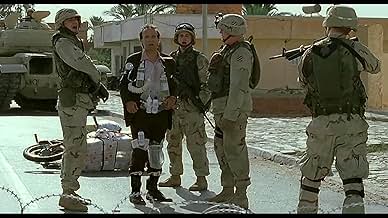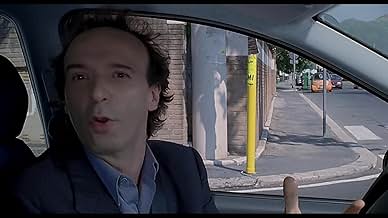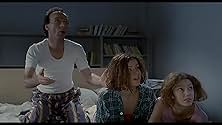AVALIAÇÃO DA IMDb
7,0/10
15 mil
SUA AVALIAÇÃO
Adicionar um enredo no seu idiomaA love-struck Italian poet is stuck in Iraq at the onset of an American invasion.A love-struck Italian poet is stuck in Iraq at the onset of an American invasion.A love-struck Italian poet is stuck in Iraq at the onset of an American invasion.
- Direção
- Roteiristas
- Artistas
- Prêmios
- 5 vitórias e 10 indicações no total
- Direção
- Roteiristas
- Elenco e equipe completos
- Produção, bilheteria e muito mais no IMDbPro
Avaliações em destaque
After the Holocaust, Roberto Benigni tackles a more recent but still tricky subject: the second Gulf War.And just like he did with his masterpiece, La Vita è Bella, he perfectly mixes comedy and tragedy, telling a story about love, life and death.
The first half-hour is 100% comedy, as we see Attilio de Giovanni(Benigni) take care of his teenage daughters, teach poetry at university, befriend a camel and desperately woo a woman, Vittoria (Nicoletta Braschi).There's even time for a really funny Sergio Leone homage. The trouble begins when Vittoria is dying in a hospital in Baghdad during the war (she went to Iraq to write a book), and Attilio tries to save her life with the help of his friend and fellow poet Fuad (Jean Reno, whose Italian is remarkably good).Expect a race against the clock stuffed with some incredibly funny material: more camels, Attilio praying Allah (one of the highlights) and even getting caught by American troops because suspected of being a suicide-bomber ("I am Italian" is what he keeps screaming during said scene).
There are a few plot holes (mostly concerning Fuad and his final scene,which has no explanation), but luckily the movie works anyway. Benigni has lost none of his vitality, and he uses all of it in this great picture reminiscent of Chaplin's best films (there's an explicit reference to City Lights).
Poetic and unbelievably beautiful, not to mention really funny, it's a must-see for lovers of European cinema throughout the world.
8,5/10
The first half-hour is 100% comedy, as we see Attilio de Giovanni(Benigni) take care of his teenage daughters, teach poetry at university, befriend a camel and desperately woo a woman, Vittoria (Nicoletta Braschi).There's even time for a really funny Sergio Leone homage. The trouble begins when Vittoria is dying in a hospital in Baghdad during the war (she went to Iraq to write a book), and Attilio tries to save her life with the help of his friend and fellow poet Fuad (Jean Reno, whose Italian is remarkably good).Expect a race against the clock stuffed with some incredibly funny material: more camels, Attilio praying Allah (one of the highlights) and even getting caught by American troops because suspected of being a suicide-bomber ("I am Italian" is what he keeps screaming during said scene).
There are a few plot holes (mostly concerning Fuad and his final scene,which has no explanation), but luckily the movie works anyway. Benigni has lost none of his vitality, and he uses all of it in this great picture reminiscent of Chaplin's best films (there's an explicit reference to City Lights).
Poetic and unbelievably beautiful, not to mention really funny, it's a must-see for lovers of European cinema throughout the world.
8,5/10
The Tiger and the Snow is a beautiful romantic movie, and it opened quite perfectly with an awesome ballad "You Can Never Hold Back Spring", performed by Tom Waits himself. Written and directed by Italian Roberto Benigni (famed for the wonderful LIfe is Beautiful), he also stars as the lead Attilio de Giovanni, a lovestruck poet who falls for a woman in his recurring dreams.
Only of course, to wake up each time he dreams of them at the alter, and when she is about to declare her undying love for him, punctuated with promises of hot sex. Yes, you read that right. But I digress. In reality, he's an absent minded poetry professor who always forgets where he parks his car. But despite his quirky looks and demeanor (are Benigni's characters always like that I wonder), imagine the pandemonium within him when he finally meets the woman in his dreams, Vittoria (the object of his obsession played by wife in real life Nicoletta Braschi), an acquaintance of fellow writer Fuad (Jean Reno).
Meeting in the dreams, and meeting for real can hardly be any different, and his infatuation with and love for Vittoria goes unrequited. Until of course we examine through to the rest of the movie, how unconditional and large this love for her is, when he takes it upon himself to journey to and through war-strife Iraq to save her from injury, through hell and high water, in dogged pursuit of elements that can save the love of his life.
Although infused with bits of comedy now and then, the movie takes a long hard look at how much one will do for someone else whom you love deeply. It might be a case of "nothing is impossible", given the will and the affection. But what if you know that what you're doing will likely to be unnoticed, or unappreciated, or unrequited. Then what? Hence the power of unconditional love. Truly very rare indeed. Should you feel, as the movie progresses, that certain bits seemed a little out of place, my advice is to persevere until the end, where a sleight of hand twist is introduced, and given the 20/20 hindsight, you'll begin to ponder, and understand this love a little more.
It's bittersweet, and with moments that might touch you. But alas, this is no Life is Beautiful, and although it has its moments with the beautiful make belief cinematographic elements in the end, it somehow lacked that extra bit of emotional depth to truly move an audience.
Oh, and that fellow blonde teacher, now she's hot!
Only of course, to wake up each time he dreams of them at the alter, and when she is about to declare her undying love for him, punctuated with promises of hot sex. Yes, you read that right. But I digress. In reality, he's an absent minded poetry professor who always forgets where he parks his car. But despite his quirky looks and demeanor (are Benigni's characters always like that I wonder), imagine the pandemonium within him when he finally meets the woman in his dreams, Vittoria (the object of his obsession played by wife in real life Nicoletta Braschi), an acquaintance of fellow writer Fuad (Jean Reno).
Meeting in the dreams, and meeting for real can hardly be any different, and his infatuation with and love for Vittoria goes unrequited. Until of course we examine through to the rest of the movie, how unconditional and large this love for her is, when he takes it upon himself to journey to and through war-strife Iraq to save her from injury, through hell and high water, in dogged pursuit of elements that can save the love of his life.
Although infused with bits of comedy now and then, the movie takes a long hard look at how much one will do for someone else whom you love deeply. It might be a case of "nothing is impossible", given the will and the affection. But what if you know that what you're doing will likely to be unnoticed, or unappreciated, or unrequited. Then what? Hence the power of unconditional love. Truly very rare indeed. Should you feel, as the movie progresses, that certain bits seemed a little out of place, my advice is to persevere until the end, where a sleight of hand twist is introduced, and given the 20/20 hindsight, you'll begin to ponder, and understand this love a little more.
It's bittersweet, and with moments that might touch you. But alas, this is no Life is Beautiful, and although it has its moments with the beautiful make belief cinematographic elements in the end, it somehow lacked that extra bit of emotional depth to truly move an audience.
Oh, and that fellow blonde teacher, now she's hot!
Roberto Benigni is such a likable guy. He's also one of the most talkative, if you've seen any of his films. Man, this guy rattles off sentences so fast it almost gives me a headache. It's doubly tough when you have to read a lot of subtitles in a hurry to keep up with him! It's also not easy when you're not quite sure what's going on, at least in the first third of the movie as scenes switch with a number of flashbacks. By the 25-minute mark of this movie, I was worn out to sort everything out and follow Benigni's rapid-fire speech. He also has a strange way - at least to us Americans - of expressing himself and his humor. He's definitely different.
No sense going into the rest of the story as other reviewers have capably done that. Overall, it was a nice story and it had some very touching moments. You have to root for Benigni's good-hearted character, "Attilio, "who certainly deserved a better wife than he got. His kids were super, nice girls. Also fun to watch and hear was Tom Waits, who plays the piano and sings throughout the film on-screen. One more thing: there was no preaching about the war in Iraq. The filmmakers were smart enough to let the viewer think for themselves.
No sense going into the rest of the story as other reviewers have capably done that. Overall, it was a nice story and it had some very touching moments. You have to root for Benigni's good-hearted character, "Attilio, "who certainly deserved a better wife than he got. His kids were super, nice girls. Also fun to watch and hear was Tom Waits, who plays the piano and sings throughout the film on-screen. One more thing: there was no preaching about the war in Iraq. The filmmakers were smart enough to let the viewer think for themselves.
I think the difference between the great and the normal artist lies in how they can re-produce the magic moments of art. The film "The life is beautiful" (TLIB) from Benigni was a nice surprise for me several years ago and now I thought let's see, what else he can do. To be absolutely honest this film is not as good, as the (TLIB), but I felt the magic once again. This film was not so deep, maybe, but it has something that I've never found in (american) comedies. There the source of the humor is often disgusting and it completely misses the real, intelligent humor, which can be found here. I definitely liked this film with all of errors and weaknesses in it. It's worth of watching.
To understand fully Roberto Benigni you have to know him also as a person, in his interviews talking about life, love, happiness, religion, poetry, he can improvise a rimed limerick because that is what the people of his village where doing an everyday pastime; the knowledge he has of "The Divine Comedy" (that he can recite by heart), of literature, philosophy is truly impressive. Or you should see him when in his he stand ups challenges bad politicians, they hate him but they cannot silence him, because he his so much loved and he is such an undeniable great mind. He his an intellectual, a poet, a philosopher, a splendid human being, one of the kind, he a precious intellectual treasure for humanity. So watching his films and mistake him just for a clown, a comedy film writer, actor, director, is extremely diminishing and very misjudging of his intellect. In "La vita è bella" he got the world recognition he deserved, but most of all as Italian I was so happy and proud to finally share him with people from all over the world. Few people misunderstood his way of talking about something very serious in such a light way, they didn't understood that his respect for the Holocaust victims is so great, that wouldn't never portrait the reality of the horror in a film for as to watch as voyeurs. In the following film "Pinocchio", people went the see a Walt Disney Pinocchio and got the real Pinocchio, the Toscany not the Hollywood one, the best and most faithful to the original Collodi story (as you would aspect from Benigni), I've seen so far, which is not so much a fable for children as it is an unforgiving portrait of power a challenging definition of what is good or bad, much to intellectual to be understood and appreciate by great audiences. This one is all about love, the love for a woman, in the speech he does about what life would be without the woman he loves, he is unbeatable, men should take notes; love and great respect of others culture showing how intellectually enriching and vital is to understand and embrace others culture and diversity rather than force ours upon; love for life over war. Everything he does is worth watching and listening, he is special and I am so glad he is around with is infectious joy for life, boy if we all need him.
Você sabia?
- CuriosidadesRoberto Benigni named his character "Attilio" as a tribute to poet Attilio Bertolucci (1911-2000) father of famous directors Giuseppe and Bernardo Bertolucci.
- Erros de gravaçãoWhen Attilio is stopped by US soldiers near Baghdad, a tall mountain range can be seen in the background, when there are no such mountains anywhere near Baghdad.
- Citações
Attilio de Giovanni: If she dies, they can close this whole show of a world... they can cart it off, unscrew the stars, roll up the sky and put it on a truck, they can turn off this sunlight I love so much. Do you know why I love it so much? Because I love her when the sun shines on her. They can take everything away, these carpets, columns, houses, sand, wind, frogs, ripe watermelons, hail, seven in the evening, May, June, July, basil, bees, the sea, courgettes...
- Versões alternativasOn the North American home video release, the aspect ratio was cropped to 1.85:1.
- ConexõesFeatured in Tom Waits: The Acting Years (2019)
- Trilhas sonorasGranada
Performed by Claudio Villa
Principais escolhas
Faça login para avaliar e ver a lista de recomendações personalizadas
- How long is The Tiger and the Snow?Fornecido pela Alexa
Detalhes
- Data de lançamento
- País de origem
- Central de atendimento oficial
- Idiomas
- Também conhecido como
- The Tiger and the Snow
- Locações de filme
- Empresa de produção
- Consulte mais créditos da empresa na IMDbPro
Bilheteria
- Orçamento
- US$ 35.000.000 (estimativa)
- Faturamento bruto nos EUA e Canadá
- US$ 10.167
- Fim de semana de estreia nos EUA e Canadá
- US$ 3.701
- 31 de dez. de 2006
- Faturamento bruto mundial
- US$ 25.460.023
- Tempo de duração
- 1 h 54 min(114 min)
- Cor
- Mixagem de som
- Proporção
- 2.35 : 1
Contribua para esta página
Sugerir uma alteração ou adicionar conteúdo ausente

























